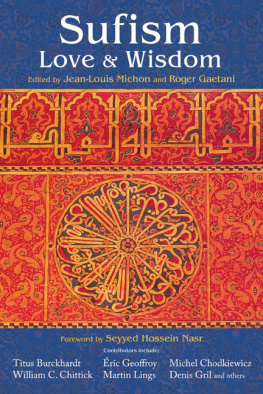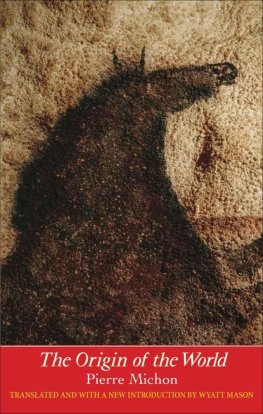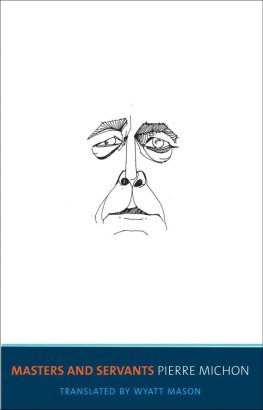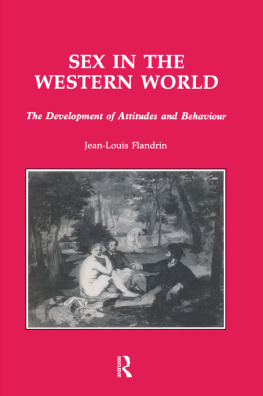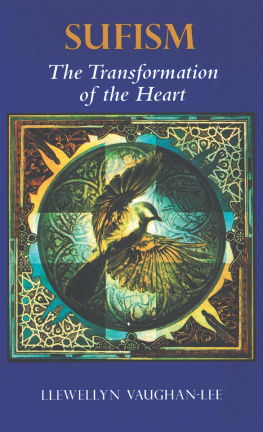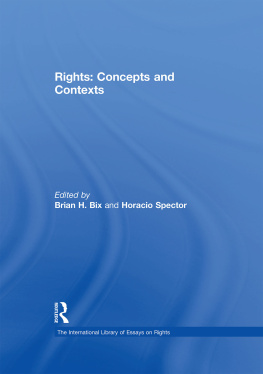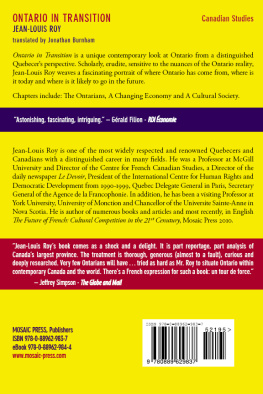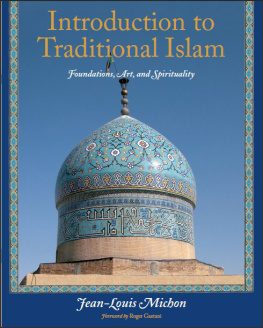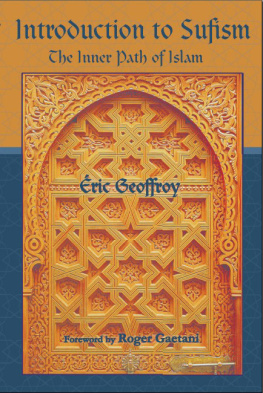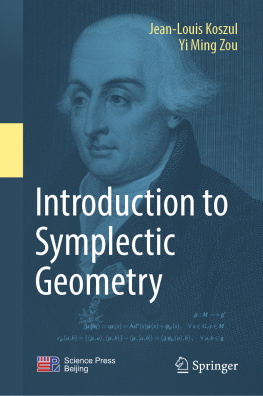Jean-Louis Michon - Sufism: Love and Wisdom
Here you can read online Jean-Louis Michon - Sufism: Love and Wisdom full text of the book (entire story) in english for free. Download pdf and epub, get meaning, cover and reviews about this ebook. year: 2006, publisher: World Wisdom, genre: Religion. Description of the work, (preface) as well as reviews are available. Best literature library LitArk.com created for fans of good reading and offers a wide selection of genres:
Romance novel
Science fiction
Adventure
Detective
Science
History
Home and family
Prose
Art
Politics
Computer
Non-fiction
Religion
Business
Children
Humor
Choose a favorite category and find really read worthwhile books. Enjoy immersion in the world of imagination, feel the emotions of the characters or learn something new for yourself, make an fascinating discovery.
- Book:Sufism: Love and Wisdom
- Author:
- Publisher:World Wisdom
- Genre:
- Year:2006
- Rating:4 / 5
- Favourites:Add to favourites
- Your mark:
- 80
- 1
- 2
- 3
- 4
- 5
Sufism: Love and Wisdom: summary, description and annotation
We offer to read an annotation, description, summary or preface (depends on what the author of the book "Sufism: Love and Wisdom" wrote himself). If you haven't found the necessary information about the book — write in the comments, we will try to find it.
Sufism: Love and Wisdom — read online for free the complete book (whole text) full work
Below is the text of the book, divided by pages. System saving the place of the last page read, allows you to conveniently read the book "Sufism: Love and Wisdom" online for free, without having to search again every time where you left off. Put a bookmark, and you can go to the page where you finished reading at any time.
Font size:
Interval:
Bookmark:
The editors wish to thank the following authors, editors, and publishers for their consent to publish the articles in this anthology:
Titus Burckhardt, Sufi Doctrine and Method (the chapter in the present volume includes the chapters At-Taawwuf, Sufism and Mysticism, and Rites from):
An Introduction to Sufi Doctrine, Thorsons Publishers Limited, 1976, pp. 15-27, 99-105. Translated from French by D. M. Matheson.
William C. Chittick, Sufism and Islam:
The Sufi Doctrine of Rumi, World Wisdom, 2005, pp. 9-21.
Michel Chodkiewicz, The Vision of God According to Ibn Arab: Journal of the Muhyiddin Ibn Arabi Societ y, Volume 14, 1993, pp. 5367. Translated from French by Cecilia Twinch.
ric Geoffroy, Approaching Sufism (this chapter is taken from a longer chapter entitled Approches in):
Initiation au Soufisme, Librairie Arthme Fayard, 2003, pp. 15-30. Translated from French by Roger Gaetani.
Denis Gril, The Prophetic Model of the Spiritual Master in Islam (Le Modle Prophtique du Matre Spirituel en Islam):
Maestro e discepolo, ed. Giovanni Filoramo, Morcelliana, 2002, pp. 345-360. Translated from French by Roger Gaetani.
Ren Gunon, aqqa and Shara in Islam (the chapter in the present volume includes the chapters Islamic Esoterism and The Shell and the Kernel [Al-Qishr wa al-Lubb] from):
Insights into Islamic Esoterism and Taoism, Sophia Perennis, 2004, pp. 1-13. Translated from French by Henry D. Fohr.
Martin Lings, Sufi Answers to Questions on Ultimate Reality: Studies in Comparative Religion, 13:.3 & 4, 1979, pp. 137-148.
Angus Macnab, Sufism in Muslim Spain (the chapter in the present volume includes the chapters Spanish Sufism and Sultans and Sufis from):
Spain Under the Crescent Moon, Fons Vitae, 1999, pp. 129-140.
Maria Massi Dakake, Walking upon the Path of God like Men?: Women and the Feminine in the Islamic Mystical Tradition:
Sophia 8:2, Winter 2002, pp. 117-138.
Jean-Louis Michon, Sacred Music and Dance in Islam:
Islamic Spirituality: Manifestations, ed. Seyyed Hossein Nasr, The Crossroad Publishing Company, 1997, pp. 469-483 & 486-489. Translated from French by Katherine OBrien.
Seyyed Hossein Nasr, The Spiritual Needs of Western Man and the Message of Sufism:
Islam and the Plight of Modern Man, ABC International Group, Inc., 2001, pp. 71-100.
Leo Schaya, On the Name Allh (Du Nom d Allh):
La Doctrine Soufique de lUnit, Adrien-Maisonneuve, 1962, pp. 7986. Translated from French by Roger Gaetani.
Reza Shah-Kazemi, Jesus in the Quran: Selfhood and CompassionAn Akbari Perspective:
Journal of the Muhyiddin Ibn Arabi Societ y, Volume 29, 2001, pp. 57-75.
William Stoddart, Aspects of Islamic Esoterism:
Studies in Comparative Religion, 13:.3 & 4, 1979, pp. 215-224.
Frithjof Schuon, The Quintessential Esoterism of Islam:
Sufism: Veil and Quintessence, World Wisdom, forthcoming in 2007. Translated from French by Mark Perry.
Series by World Wisdom
The Betrayal of Tradition: Essays on the Spiritual Crisis of Modernity, edited by Harry Oldmeadow, 2005
Borderlands of the Spirit: Reflections on a Sacred Science of Mind, by John Herlihy, 2005
A Buddhist Spectrum: Contributions to Buddhist-Christian Dialogue, by Marco Pallis, 2003
The Essential Ananda K. Coomaraswamy, edited by Rama P. Coomaraswamy, 2004
The Essential Sophia, edited by Seyyed Hossein Nasr and Katherine OBrien, 2006
The Essential Titus Burckhardt: Reflections on Sacred Art, Faiths, and Civilizations, edited by William Stoddart, 2003
Every Branch in Me: Essays on the Meaning of Man, edited by Barry McDonald, 2002
Islam, Fundamentalism, and the Betrayal of Tradition: Essays by Western Muslim Scholars, edited by Joseph E. B. Lumbard, 2004
Journeys East: 20th Century Western Encounters with Eastern Religious Traditions, by Harry Oldmeadow, 2004
Living in Amidas Universal Vow: Essays in Shin Buddhism, edited by Alfred Bloom, 2004
Paths to the Heart: Sufism and the Christian East, edited by James S. Cutsinger, 2002
Returning to the Essential: Selected Writings of Jean Bis, translated by Deborah Weiss-Dutilh, 2004
Science and the Myth of Progress, edited by Mehrdad M. Zarandi, 2003
Seeing God Everywhere: Essays on Nature and the Sacred, edited by Barry McDonald, 2003
Singing the Way: Insights in Poetry and Spiritual Transformation, by Patrick Laude, 2005
Sufism: Love & Wisdom, edited by Jean-Louis Michon and Roger Gaetani, 2006
Ye Shall Know the Truth: Christianity and the Perennial Philosophy, edited by Mateus Soares de Azevedo, 2005
Titus Burckhardt
At-Taawwuf
Sufism, Taawwuf,1 which is the esoteric or inward (bin) aspect of Islam, is to be distinguished from exoteric or external (hir) Islam just as direct contemplation of spiritual or divine realities is distinguishable from the fulfilling of the laws which translate them in the individual order in connection with the conditions of a particular phase of humanity. Whereas the ordinary way of believers is directed towards obtaining a state of blessedness after death, a state which may be attained through indirect and, as it were, symbolical participation in Divine Truths by carrying out prescribed works, Sufism contains its end or aim within itself in the sense that it can give access to direct knowledge of the eternal.
This knowledge, being one with its object, delivers from the limited and inevitably changing state of the ego. The spiritual state of baq, to which Sufi contemplatives aspire (the word signifies pure subsistence beyond all form), is the same as the state of moka or deliverance spoken of in Hindu doctrines, just as the extinction (al-fan) of the individuality which precedes the subsistence is analogous to nirva, taken as a negative idea.
For Sufism to permit of such a possibility it must be identified with the very kernel (al-lubb) of the traditional form which is its support. It cannot be something super-added to Islam, for it would then be something peripheral in relation to the spiritual means of Islam. On the contrary, it is in fact closer to their superhuman source than is the religious exoterism and it participates actively, though in a wholly inward way, in the function of revelation which manifested this traditional form and continues to keep it alive.
This central role of Sufism at the heart of the Islamic world may be veiled from those who examine it from outside because esoterism, while it is conscious of the significance of forms, is at the same time in a position of intellectual sovereignty in relation to them and can thus assimilate to itselfat any rate for the exposition of its doctrinecertain ideas or symbols derived from a heritage different from its own traditional background.
It may appear strange that Sufism should on the one hand be the spirit or heart of Islam (r al-islm or qalb al-islm) and on the other hand represent at the same time the outlook which is, in the Islamic world, the most free in relation to the mental framework of that world, though it is important to note that this true and wholly inward freedom must not be confused with any movements of rebellion against the tradition; such movements are not intellectually free in relation to the forms which they deny because they fail to understand them. Now this role of Sufism in the Islamic world2 is indeed like that of the heart in man, for the heart is the vital center of the organism and also, in its subtle reality, the seat of an essence which transcends all individual form.
Font size:
Interval:
Bookmark:
Similar books «Sufism: Love and Wisdom»
Look at similar books to Sufism: Love and Wisdom. We have selected literature similar in name and meaning in the hope of providing readers with more options to find new, interesting, not yet read works.
Discussion, reviews of the book Sufism: Love and Wisdom and just readers' own opinions. Leave your comments, write what you think about the work, its meaning or the main characters. Specify what exactly you liked and what you didn't like, and why you think so.

